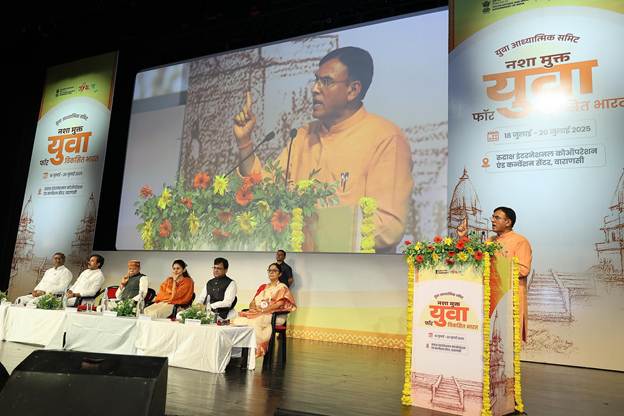The Youth Spiritual Summit, held under the theme Nasha Mukt Yuva for Viksit Bharat, concluded on Sunday at the Rudraksh International Convention Centre in Varanasi with the formal adoption of the Kashi Declaration — a visionary roadmap to drive a nationwide youth-led movement against drug addiction
Organised by the Ministry of Youth Affairs and Sports, the summit brought together over 600 youth leaders from more than 120 spiritual and socio-cultural organisations, along with academicians, experts, and government representatives. The event was a moment in India’s pursuit of a drug-free society by 2047, uniting spiritual strength with youthful resolve.
Over the course of four thematic plenary sessions, participants engaged in in-depth discussions on the psychological and social impacts of substance abuse, the complexities of drug trafficking and supply chains, grassroots awareness strategies, and the critical role of spiritual and cultural institutions in prevention and rehabilitation. These deliberations culminated in the Kashi Declaration, which outlines a multi-dimensional and collaborative approach to drug de-addiction, rooted in India’s civilisational ethos and driven by youth leadership.
Addressing the gathering, Union Minister of Youth Affairs and Sports, Dr. Mansukh Mandaviya, described the declaration as a collective Sankalp (resolve) arising from the reflections and dialogue of the summit. He emphasized that the document is not just a vision statement, but a shared commitment to national transformation.
The Kashi Declaration calls for treating substance abuse as a complex public health and societal challenge. It recommends a whole-of-government and whole-of-society approach, integrating efforts from spiritual, educational, technological, and cultural domains. The declaration proposes the formation of a Joint National Committee for coordination among ministries, annual progress reporting mechanisms, and a national platform to connect individuals affected by substance abuse with support services.
Dr. Mandaviya highlighted the unique role of spiritual organisations in this campaign, stating that Bharat’s spiritual legacy must now lead the charge in creating a drug-free generation. “Spiritual institutions will serve as the backbone of this Maha Abhiyan,” he said, urging collective action through community engagement.
Governor of Himachal Pradesh, Shiv Pratap Shukla, also addressed the summit, invoking the cultural sanctity of Kashi. He described the ancient city as the “cradle of Sanatan Chetna,” where discipline and values guide personal and national progress. He warned that a nation where 65% of the population is youth cannot afford to succumb to addiction, stressing that only a liberated and conscious youth can build a strong future.
The concluding session saw the participation of several prominent leaders, including Virendra Kumar, Union Minister for Social Justice and Empowerment; Gajendra Singh Shekhawat, Union Minister for Culture and Tourism; Anil Rajbhar, Minister of State for Labour and Employment; Nityanand Rai, Minister of State for Home Affairs; and Raksha Nikhil Khadse, Minister of State for Youth Affairs and Sports.
The summit also marked a key step forward in the MY Bharat (Mera Yuva Bharat) framework. Going forward, MY Bharat volunteers and affiliated youth clubs will spearhead pledge campaigns, awareness drives, and grassroots outreach across the country. The Kashi Declaration will act as a guiding document, and its progress will be reviewed at the Viksit Bharat Young Leaders Dialogue 2026, ensuring accountability and long-term impact.










